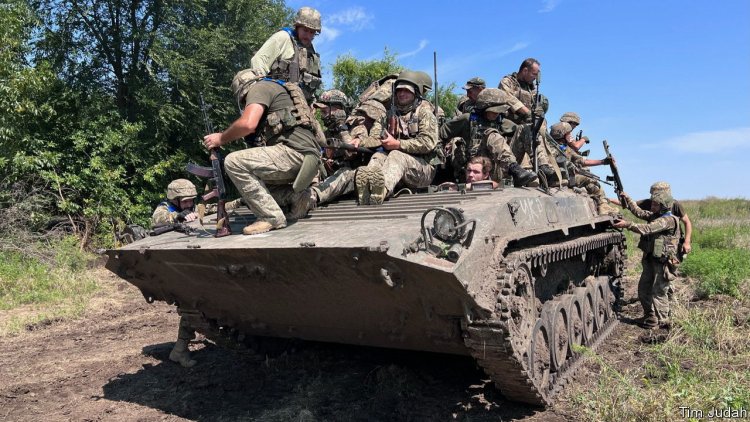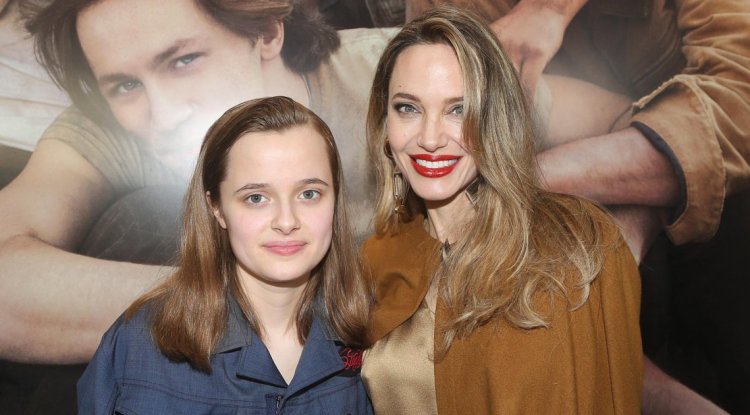Ukrainian soldiers describe their experiences battling Russia
image: Tim JudahWHEN HIS men attacked, they thought they were prepared for everything. They were wrong. “It was a black cloud,” says a platoon commander with the callsign Pole, earned after he worked in Warsaw for a decade before coming home to fight. “I don’t know if the beehives were destroyed in fighting or if the Russians opened them,” he says, but for a surreal moment thousands of enraged bees forced the men of the 128th Mountain Assault Brigade to run for it, while the Russians ran the other way, covering their retreat with rocket-propelled grenades. Sheltering beneath trees from the sun and from Russian drones, Pole and dozens of his comrades are waiting to be transported to trenches dug alongside fields resplendent with sunflowers in full bloom. From 10km away the boom of Ukrainian artillery can be heard. Beyond the cannon Ukrainian forces are battling the Russians in a bloody struggle for every metre in their attempt to punch a way through their defences on the southern Zapori


WHEN HIS men attacked, they thought they were prepared for everything. They were wrong. “It was a black cloud,” says a platoon commander with the callsign Pole, earned after he worked in Warsaw for a decade before coming home to fight. “I don’t know if the beehives were destroyed in fighting or if the Russians opened them,” he says, but for a surreal moment thousands of enraged bees forced the men of the 128th Mountain Assault Brigade to run for it, while the Russians ran the other way, covering their retreat with rocket-propelled grenades.
Sheltering beneath trees from the sun and from Russian drones, Pole and dozens of his comrades are waiting to be transported to trenches dug alongside fields resplendent with sunflowers in full bloom. From 10km away the boom of Ukrainian artillery can be heard. Beyond the cannon Ukrainian forces are battling the Russians in a bloody struggle for every metre in their attempt to punch a way through their defences on the southern Zaporizhia front.

These men could get the order to join the fray at any moment, says the company’s commander, known as Karp. For now, they are training. An infantry fighting vehicle arrives, 15 men clamber on and in a cloud of choking fumes it lurches off, transporting them to the trenches. As it lumbers through the countryside south of the road to Orikhiv, bright yellow birds flit across its path.
Most of the men are freshly called up. The nearby village of Piatykhatky was liberated by the brigade in mid-June, but the casualty rate of the operation was so high that new recruits are being readied to make up its depleted numbers. A soldier who gives his callsign as Looter says that most of the Piatykhatky casualties were wounded rather than killed. But, he adds, “I took our commander’s head from his tank.” It can be assumed that similar exercises are taking place across these endless southern fields, as men are prepared to replace those lost in the counter-offensive, which began on June 4th.
Ukraine’s push south is proceeding painfully slowly. Russian troops have prepared formidable defences which the Ukrainians are finding hard to breach. These include drones transmitting live pictures back to their operators, minefields and lingering munitions. They have hugely increased the challenges that Ukraine’s soldiers are facing compared with last year.
“The worst are tripwires,” says Pole. “which you cannot see at night, and set off a whole string of connected mines.” Combat medics who ask not to be named say that most casualties they evacuate have been injured by mines.
Arriving at the trench, the men leap off their fighting vehicle and practise “cleaning” the area of Russians. One might assume that they would only ever see a live Russian from a distance, or on a screen via pictures transmitted from a drone. Karp cautions that that is not the case. “I tell them that you can meet an enemy at even two or three metres. It happened to me. I met a Russian officer at four metres. I killed him right off.”

With a prominent beard and hair done in wartime-fashionable Cossack style, with shaved sides and a topknot, Karp is a grizzled veteran who took shrapnel to his head and neck during the Kherson offensive last October. He is only 28, but has been in the army since 2014. What annoys him more than anything are the back-seat drivers of the war. One soldier complains: “Everyone is saying ‘Go, go, go’ but these sofa-experts don’t understand the war’s reality.” Karp adds: “They are telling us how to fight and our answer is ‘Come and join our unit and then tell us what to do, and let’s see how much of a hero you are then!’”
To the north of these fields lies the main road running from the city of Zaporizhia to the shattered town of Orikhiv. This is the jumping-off point for one of the counter-offensive’s main thrusts. Smoke can be seen rising from a wrecked petrol station in the distance, and the sound of artillery punctures the summer silence of the fields.
A constant stream of troops moves back and forth. German-made Leopard tanks rumble by. With a deep, roaring grumble a tracked steel behemoth passes, a de-miner of the type Ukrainian forces are desperately short of. Its crew have stacked their rolled-up mattresses, boxes and bags of kit on top.
In shops along the dusty road soldiers buy provisions. Many travel and fight as tight-knit groups of comrades who have acquired sturdy 4x4s, often decorated with stickers such as a traffic sign of a crossed-out Putin or a pig in Russian colours. A unit that operates a Grad rocket launcher stops to buy. They complain that they have been supplied with Pakistani rockets, some of which are duds and all of which are far less precise than their long-exhausted stock of Ukrainian ones.
In the village of Preobrazhenka, just before Orikhiv, Ruslan, a civilian, says that the counter-offensive has pushed the Russians back some 5km, meaning less artillery shelling. There are no longer any children here, he says, but there are old people who need help.
The village is still being bombed, he says, pointing to a pile of rubble that was once a building. The bombs are launched by aeroplanes above occupied Tokmak, 35km farther south and one of the main targets of the counter-offensive. Ruslan grumbles that the village would be safe if the West had already delivered the F-16 fighter jets that Ukraine wants. People here are tired but the mood is still positive, he says. “We are waiting for victory,” he says, a condition that will be satisfied “when those motherfuckers are killed.” ■
What's Your Reaction?






















